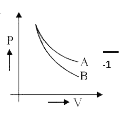if quantity of heat 1163.4 J supplied to one mole of nitrogen gas , at room temperature at constant pressure , then the rise in temperature is
54 K
28 K
65 K
40 K
The correct Answer is:D
To solve the problem of finding the rise in temperature when 1163.4 J of heat is supplied to one mole of nitrogen gas at constant pressure, we can follow these steps:
1. Identify the Molar Specific Heat at Constant Pressure (Cp):
For a diatomic gas like nitrogen (N₂), the molar specific heat at constant pressure (Cp) can be calculated using the formula:
Cp=Cv+R
where Cv is the molar specific heat at constant volume and R is the universal gas constant.
2. Calculate Cv for Nitrogen:
The degrees of freedom (F) for a diatomic gas is 5. Therefore, we can calculate Cv as:
Cv=F2R=52R
3. Substitute Cv into the Cp Formula:
Now substituting Cv into the equation for Cp:
Cp=52R+R=72R
4. Use the Heat Equation:
The heat added to the gas is related to the change in temperature (ΔT) by the equation:
Q=nCpΔT
where Q is the heat supplied, n is the number of moles, and ΔT is the change in temperature.
5. Substituting Known Values:
Given that Q=1163.4J and n=1 mole, we can rewrite the equation:
1163.4=1⋅(72R)ΔT
6. Substituting the Value of R:
The value of the gas constant R is approximately 8.314J/(mol⋅K). Thus, we have:
1163.4=(72⋅8.314)ΔT
7. Calculate Cp:
Calculate Cp:
Cp=72⋅8.314=29.1J/(mol⋅K)
8. Solving for ΔT:
Rearranging the equation to solve for ΔT:
ΔT=1163.429.1
9. Final Calculation:
Performing the calculation:
ΔT≈40K
Conclusion:
The rise in temperature when 1163.4 J of heat is supplied to one mole of nitrogen gas at constant pressure is approximately 40 K.
For a diatomic gas like nitrogen (N₂), the molar specific heat at constant pressure (Cp) can be calculated using the formula:
Cp=Cv+R
where Cv is the molar specific heat at constant volume and R is the universal gas constant.
The degrees of freedom (F) for a diatomic gas is 5. Therefore, we can calculate Cv as:
Cv=F2R=52R
Now substituting Cv into the equation for Cp:
Cp=52R+R=72R
The heat added to the gas is related to the change in temperature (ΔT) by the equation:
Q=nCpΔT
where Q is the heat supplied, n is the number of moles, and ΔT is the change in temperature.
Given that Q=1163.4J and n=1 mole, we can rewrite the equation:
1163.4=1⋅(72R)ΔT
The value of the gas constant R is approximately 8.314J/(mol⋅K). Thus, we have:
1163.4=(72⋅8.314)ΔT
Calculate Cp:
Cp=72⋅8.314=29.1J/(mol⋅K)
Rearranging the equation to solve for ΔT:
ΔT=1163.429.1
Performing the calculation:
ΔT≈40K
The rise in temperature when 1163.4 J of heat is supplied to one mole of nitrogen gas at constant pressure is approximately 40 K.
Similar Questions
Knowledge Check
The amount of heat supplied to 4×10−2 kg of nitrogen at room temperature to rise its temperature by 50∘C at constant pressure is (Molecular mass of nitrogen is 28 and R=8.3Jmol−1K−1)
A2.08KJB3.08KJC4.08KJD5.08KJ
If 21 J of heat energy is supplied to an ideal diatomic gas at constant pressure, then the change in its energy is
View SolutionOne mole of a gas is heated at constant pressure to raise its temperature by 1∘C. The work done in joules is
View SolutionWhat amount of heat must be supplied to 2×10−2Kg of nitrogen at room temperature to rise its temperature by 45∘C at constant pressure? Given molecular mass of nitrogen is 28 and R=8.3Jmole−1K−1
View SolutionHeat supplied to an ideal gas sample at constant Pressure :
View SolutionTemperature of one mole of a gas is increased by 1∘ C at constant pressure. The work done on the system is

View SolutionA gas cylinder can hold 1 kg of hydrogen at room temperature and pressure :
Find the number of moles of hydrogen present.
View SolutionWhen a certain amount of heat is supplied to a diatomic gas at constant volume, rise in temperature is T0. When same heat is supplied to the gas at constant pressure, find the rise in temperature
View Solution
